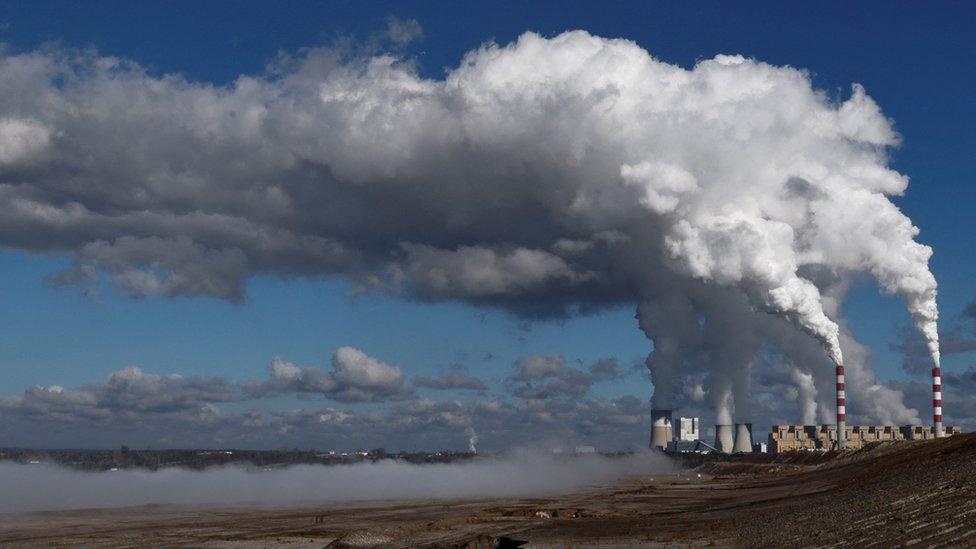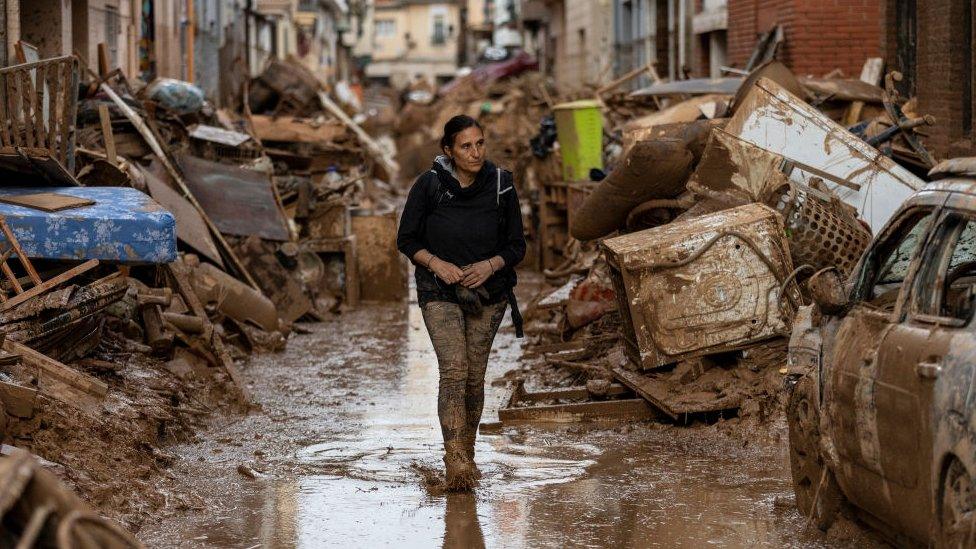Dubai airport chaos as UAE and Oman reel from deadly storms
- Published
WATCH: Heavy rain causes flash flooding in Dubai
Heavy rain has continued to batter Gulf states, causing deadly flash floods and disrupting flights at the world's second-busiest airport.
Dubai International Airport warned of "very challenging conditions" and advised some passengers not to turn up due to areas being inundated by water.
Further north, a man died when his car was caught in flash floods.
In Oman, rescuers found the body of a girl in Saham, bringing the death toll in the country to 19 since Sunday.
On Wednesday, about 300 flights to and from Dubai International Airport - a major hub for connecting flights to every continent - were cancelled, according to Flight Aware data, and hundreds more were delayed.
The airport, which last year served more than 80 million passengers, external, second only to Atlanta in the United States, warned recovery would take "some time".
On Wednesday it advised against visiting Terminal 1 without confirmation from airlines and avoiding trips to the airport.
Emirates, a major international airline headquartered in Dubai, suspended check-in for passengers departing from the city until Thursday.
Authorities warned that more thunderstorms, heavy rain and strong winds were forecast, with many low-lying areas still under water.
The United Arab Emirates, Oman's northern neighbour, experienced on Tuesday its largest rainfall event since records began 75 years ago.
The National Centre of Meteorology announced that, external 254.8mm (9.7in) had fallen on Khatm al-Shakla, in the region of al-Ain, over less than 24 hours.
The country averages 140-200 mm of rainfall per year, while Dubai typically receives only 97mm. The monthly average for April is only about 8mm.
Footage from the centre of Dubai showed dozens of submerged vehicles on a flooded part of Sheikh Zayed Road, as well as long traffic jams elsewhere on the 12-lane highway.
'It's been total chaos'
Kate and Andrew Golding were among several British tourists stranded at the main international airport. They had been there for 12 hours.
"I'm trying to get on another flight," Andrew, 62, told BBC News. "My wife, Kate, is standing in another queue as we're trying to hedge our bets."
The couple from Kent were on holiday to celebrate Kate's 60th birthday, a trip Andrew says she will now "never forget".

Kate and Andrew Golding are now queuing separately in a bid to improve their luck
"It has been worse I think than anyone expected, but the system within the airport has completely fallen apart and Emirates, which I consider to be one of finest airlines - no staff, no information, no coordination, no professionalism, no care - no disaster planning at Emirates, it's weird - big companies normally plan for these events.
"It's been total chaos.
"People are sleeping in the lounges, on the floors, food packets everywhere. It's just been a pretty filthy experience really."
BBC News has contacted Emirates for comment.
'Passengers shouting'
Elsewhere at the airport, Anne Wing, from Rotherham, South Yorkshire, was with her husband and three children hoping to fly to London Heathrow.
They arrived at the airport at 08:00 local time (04:00 GMT) for their 11:25 flight, and were initially told it had been delayed by an hour.
"We have spoken to no-one from Emirates since 08:00 this morning," she said.
"Passengers were shouting and rioting at the connection desk, there were no staff to be seen."
"It's horrific, we are squashed in like animals - it is dangerous and inhumane," she added. "It's absolutely ridiculous here".
She said her family had not eaten since lunchtime, and all that had been provided were some "small cartons of water".
The BBC was also contacted by passengers who were diverted to another Dubai airport, known as Dubai World Central, who described similar scenes and a lack of proper meals and water.
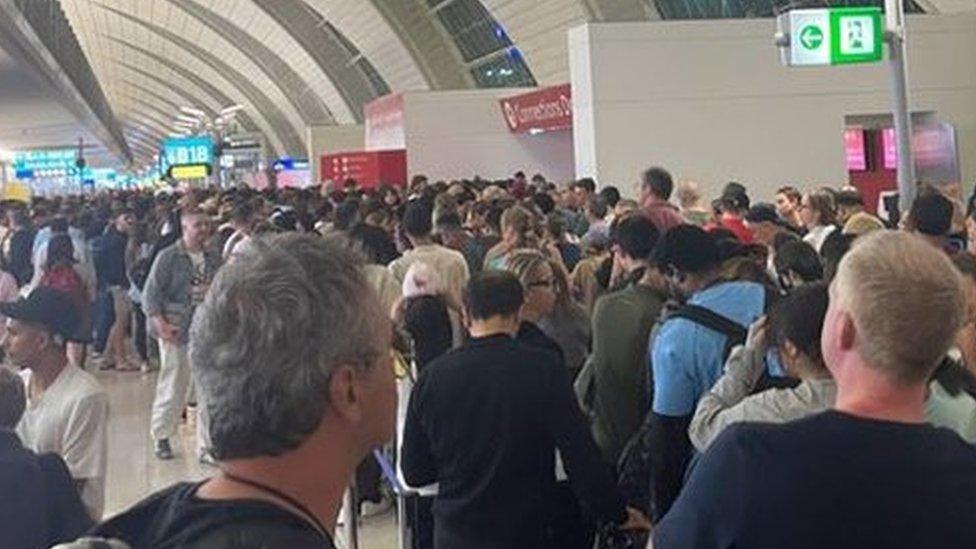
Anne Wing reported lengthy queues at the airport on Wednesday evening
No deaths were reported in Dubai, but an elderly man was killed when his vehicle was swept away in a flash flood in Ras al-Khaimah.
Although the rain in Dubai had eased by Tuesday evening, Dubai International Airport warned of further disruption, and said there was crowding.
The intense storm that began on Tuesday morning and continued through most of the day forced the airport to suspend operations for 25 minutes, divert several inbound planes and cancel a number of inbound and outbound flights.
Videos posted on social media showed aircraft ploughing through several inches of water that completely covered the airport's apron and taxiways.
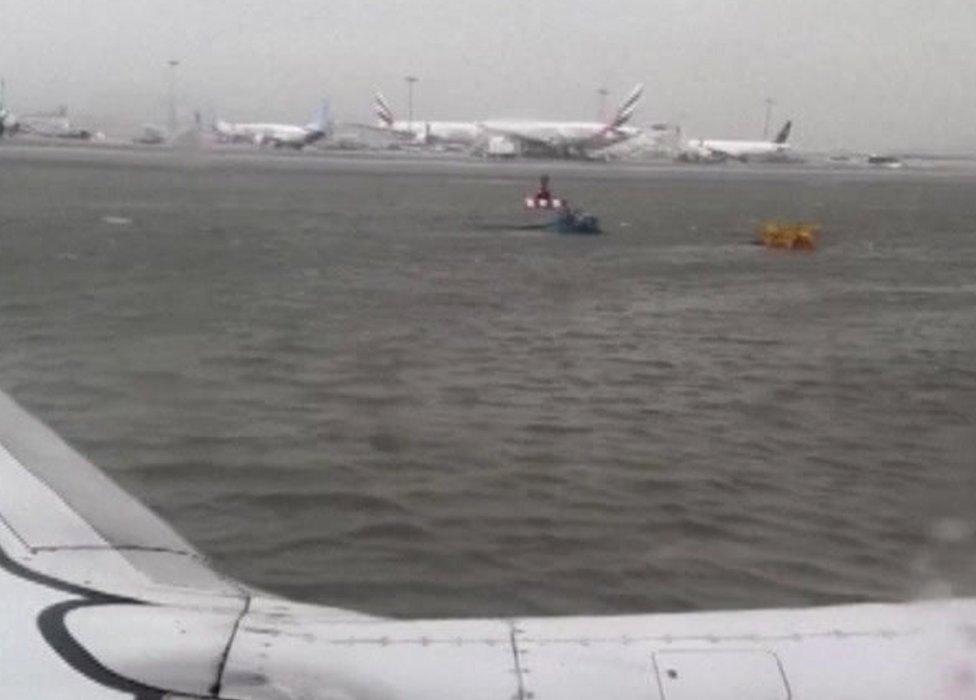
Dubai International Airport's apron resembled a lake during the storm, videos posted on social media showed
"We are currently experiencing significant disruption due to the weather and are continuously working with our emergency response teams and service partners to restore normal operations as quickly as possible," it said on X, formerly Twitter, external.
Emirates, one of the UAE's two flag carriers and the world's largest international airline, told customers that check-in had been suspended at the airport for all flights until 09:00 on Thursday, external.
The chief executive of Dubai Airports, Paul Griffiths, told local radio station Dubai Eye: "In living memory, I don't think anyone has ever seen conditions like it."
Software engineer Kanish Kumar Deb Barman, who became stuck at the airport on his way home to India, told Reuters news agency: "There are hundreds and thousands of other passengers just like me in this airport who have been waiting for 10 hours, 16 hours, some even for 24 to 30 hours."
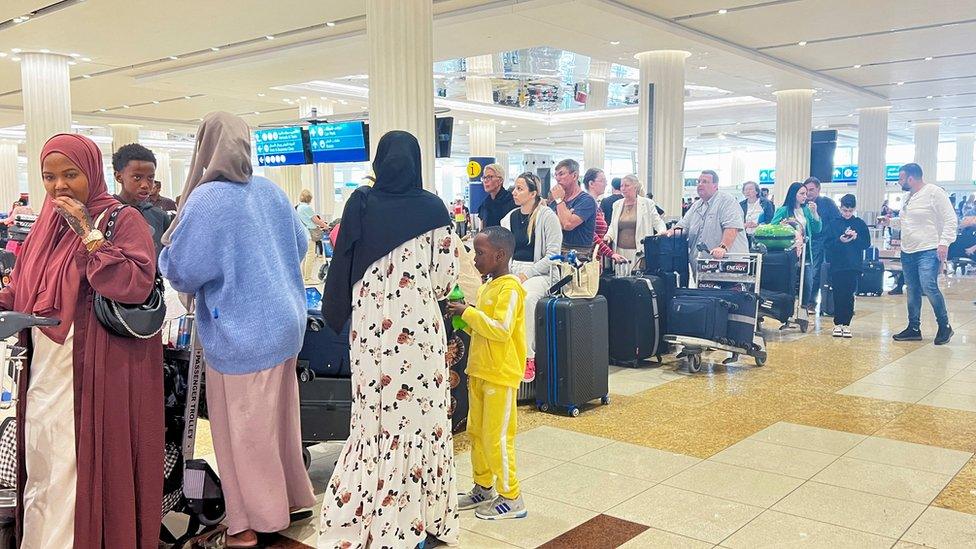
People queue at the check-in counter at Dubai International Airport on Wednesday
The UAE's National Emergency Crisis Management Authority did issue a warning before the storm, telling people to stay at home. The government also told its employees to work from home and private schools were also advised to carry out remote learning.
In Oman, more than 1,400 people have been evacuated to shelters. Schools and government offices have been closed as a precaution.
On Sunday, 10 schoolchildren aged between 10 and 15 and an adult were killed when their bus was swamped by floodwater, external as it attempted to drive through a wadi in the al-Mudhaibi area of Sharqiya province, about 115km (70 miles) south of the capital, Muscat.
Three other children and the driver were rescued. Two of them were reportedly airlifted to safety after being swept 600m (1,970ft) from the bus.
The sultanate's council of ministers said it was "filled with grief" over the deaths and sent their condolences to the victims' families.
Precipitation is scarce in Oman. Annual average rainfall ranges from 150 to 300mm in the north, external, with most falling in pre- and post-monsoon storms.
In the hours that followed the floods, some social media users wrongly attributed the extreme weather solely to recent cloud seeding operations in the country. Cloud seeding, which is when planes spray clouds with particles to make rain, has been going on in the United Arab Emirates for more than 10 years.
However, experts say that at best it would have had a minor effect on the storm and that focusing on cloud seeding is "misleading".
"The UAE does have an operational cloud seeding programme to enhance the rainfall in this arid part of the world, however, there is no technology in existence that can create or even severely modify this kind of rainfall event," said Prof Maarten Ambaum from the University of Reading.
BBC Weather meteorologist Matt Taylor also noted the storm had already been forecast.
"This was already forecast to be a severe weather event. Ahead of the event, computer models [that don't factor in potential cloud seeding effects] were already predicting well over a year's worth of rain to fall in around 24 hours.
"The impacts were much wider than I would expect from cloud-seeding alone too - severe flooding impacting large areas from Bahrain to Oman."
More than double the amount of rain expected in a year fell in just one day.
The heavy rain also hit Saudi Arabia and Bahrain, where videos showed cars stranded in flooded roads.
Many factors contribute to flooding, but a warming atmosphere caused by climate change makes extreme rainfall more likely.
The world has already warmed by about 1.1C since the industrial era began and temperatures will keep rising unless governments around the world make steep cuts to emissions.
Additional reporting by Rozina Sini and James Kelly

Have you been affected by the flooding in Dubai? Share your experiences by emailing haveyoursay@bbc.co.uk, external.
Please include a contact number if you are willing to speak to a BBC journalist. You can also get in touch in the following ways:
WhatsApp: +44 7756 165803
Tweet: @BBC_HaveYourSay, external
Please read our terms & conditions and privacy policy
If you are reading this page and can't see the form you will need to visit the mobile version of the BBC website to submit your question or comment or you can email us at HaveYourSay@bbc.co.uk, external. Please include your name, age and location with any submission.
Related topics
- Published17 April 2024

- Published17 April 2024
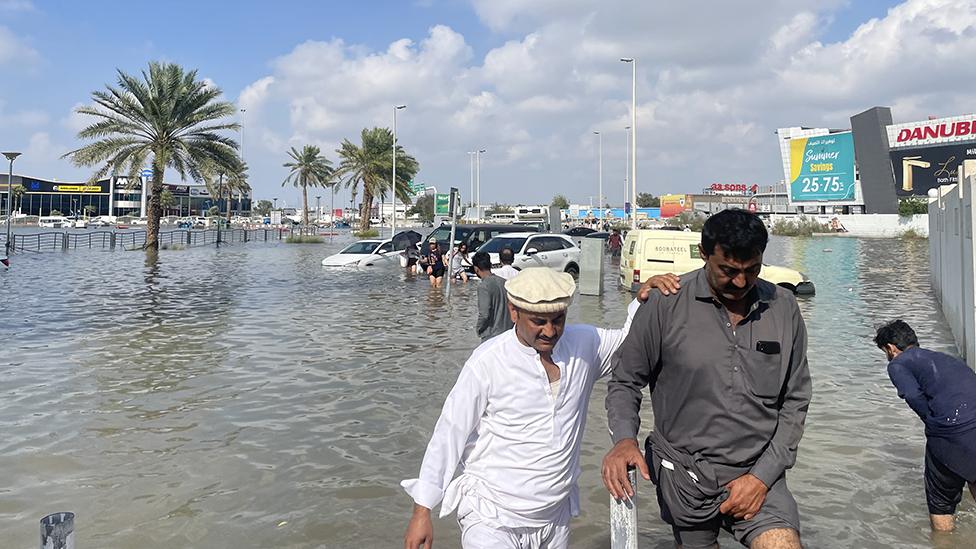
- Published6 December 2023
